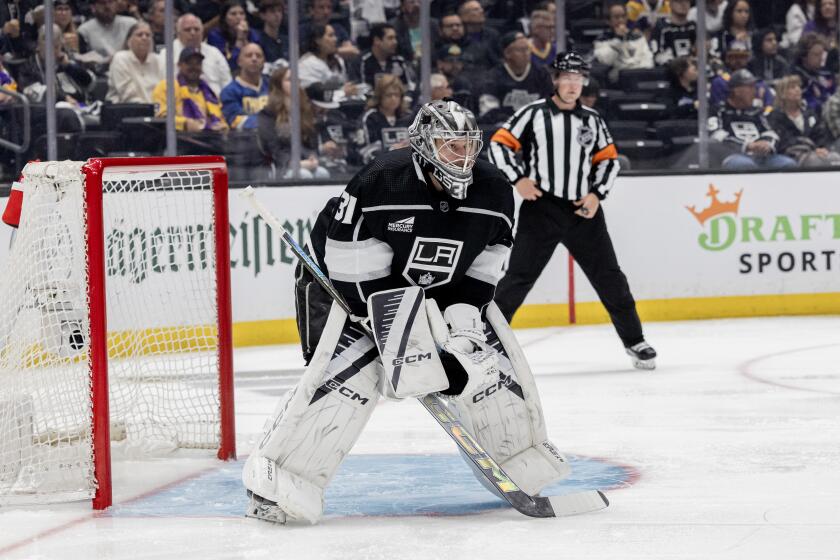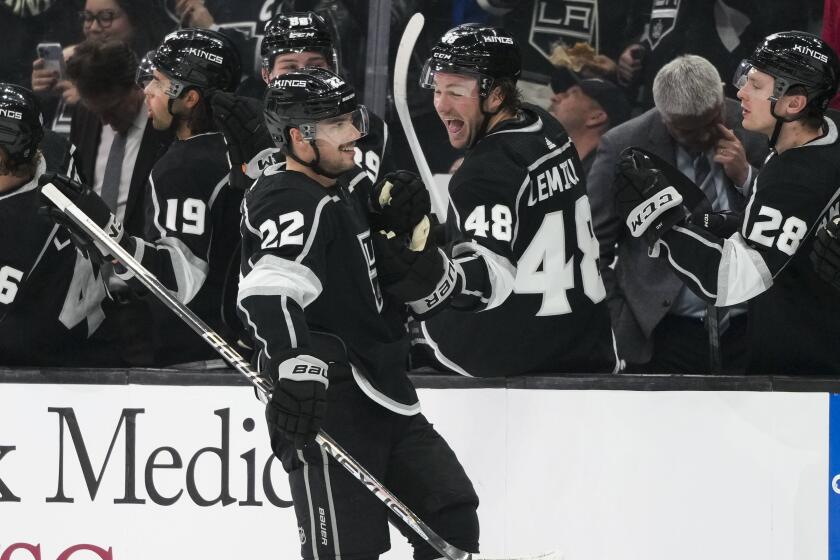The Fourth Line--Skating on Thin Ice : They Are Hockey Players on the Move, Moving Up or Getting Out of the Game
The fourth line in hockey is the last line. Fourth-liners play as if there were no tomorrow because if they don’t, there won’t be. It’ll be oblivion: The Minors.
A fourth-liner usually is on the move: to the farm team, from the farm team, beginning a career, ending one. He lives precariously, and the rewards can be meager: a periodic 40-second shift on the ice. To do what? On the fourth line, one must be willing to hit, and be hit.
The Capitals’ fourth-liners include: Big Dwight Schofield, the team enforcer whose trips to the penalty box have given it the familiarity of home but who, ominously for him, has not been playing much recently; tenacious Lou Franceschetti, whose survival instincts have carried him through eight long years in the Capitals’ organization until finally he has played his first full season in the major league; Mark Taylor, the quintessence of the fourth-liner, an unknown; the much-respected Bobby Gould, a sometimes fourth-liner, when all other lines are healthy, who represents championship depth, and fresh-faced Steve Leach, just off the college campus, The Prospect.
One player likes to hit, another prefers to skate, one is working on his defense. It’s an odd-lots collection bound by the mission of “trying to create something” as the others rest. But making magic in just seconds can be as elusive as a puck because a fourth-liner always skates while toting heavy mental baggage: One mistake and it could be off to Binghamton in the morning.
He isn’t very big--6 feet, 185 pounds. His idol always was former Montreal Canadien Frank Mahovlich, 6 feet 3, 220 pounds. Lou Franceschetti is a small man who plays big-man’s hockey. He’ll slam anyone into the boards, so hard they might feel as if they went through the boards. Of course he’s been slammed into the boards himself.
That’s a fourth-liner. Maybe he’s a little slower, maybe a little smaller. Somehow, he’s got to make up for it. Franceschetti plays as if he were fearless. At full speed he’ll check an opponent’s forward progress, and he’ll take a check. He calls this “taking the body,” as in “I like taking the body.”
He says, as if he had a choice: “Some guys are scorers, playmakers. I just like to hit.”
“He has more consistency now,” said Bryan Murray, the Capitals’ coach. “Before, he’d give it to you 40 games a year, the other 40 games he didn’t give it to you at that level.”
The “it” is Franceschetti’s body, the “level” an all-out willingness to “be involved”--hitting hard, playing hard defensively. The figure 40 was but a coach’s projection based on a few games because until this one gloriously whole National Hockey League season, Franceschetti never lasted 40 games a year with the Capitals, much less 80.
“One year I went up and down five times,” he said.
“One time my brother and cousin were coming in to see me play. I had to get on the phone at 2 in the morning and tell them to forget that, trade your plane tickets in and get your money back.”
Franceschetti was on the road again. Hershey that time.
Every summer, eight straight, Franceschetti went to camp with the Capitals. Last October was the first he opened with Washington. He had kept going down to Hershey and Binghamton and “sticking my nose in there and playing my role.” And the role? You can tell that not just by his nose, but his whole face. It’s a road map of scars and stitch marks: a blaring interstate above his left eye, innumerable blue highways.
What irony. The biggest mark on his face, above that eye, came when he walked into the edge of a coffee table when he was 5 or 6 years old. It’s just that the skin has been slashed open four or five times since. He’s been hit in the face by a puck, which broke his nose. “I’ve dished out my fair share of body checks,” he said, “so I’m bound to get some back.” In hockey, if you give, you get.
It’s that kind of give and take that earns respect in hockey, and Franceschetti is respected. He has versatility--he can play either wing. If he doesn’t score much--five goals, 11 assists--he, as they say, “works the corners” and won’t hesitate to “sacrifice a hit to get the puck out of trouble.” Even if it still hurts from one night, he’ll do it again the next.
For this, Murray will sometimes “plug him in” to other lines, and he’ll skate with the big names. So Franceschetti’s name comes up more than most fourth-liners. An unusual name for a hockey player, Franceschetti. Listening on radio, some might think Francis is his first name: Francis Getty, or Francis Sketty. “Every time I mention my last name,” he said, “people write it down as two names.”
His parents, both natives of northern Italy--his late father, Rico, a bricklayer, and mother, Aida, specialist in multi-course Italian dinners--settled in Toronto, where their Louie was born and took up skating late, at 9. Never a natural, “I always came home from the rink with my knees soaked. I was always falling.”
And then: “I went into the juniors to see how I would do. I didn’t have any expectations.”
But he told his father he would succeed and “buy a farm he always wanted so he could raise animals like he did in the old country.”
In time, Franceschetti did succeed. Most of his minor-league colleagues are “home, working for a living.” In a sense still tied to them, he has become a workaday player who, like any workaday man, has his problems. His wife Diane has miscarried twice, and when he went off to his last training camp it was with worry about hockey and her in her third pregnancy. This time, it looks as if they’re both going the distance.
Yet after all this--after teaching himself to be fearless (“You just go in and take it without even having second thoughts about it. Nine times out of 10, you’re not going to get hurt.”)--he has begun to think . . . how short his time with the Capitals probably will be.
“I’ve only got one or two years left in the game,” he said.
He’ll be only 28 on March 28. While a top-liner, blinded by the spotlight’s glare, might be surprised by the end, a fourth-liner can see clearly, if he chooses.
“I’ve got to start planning for after my career,” said Franceschetti, pausing for a glance to the future. It looked uncertain, like his past.
No heavy traffic beats the carpet in front of Mark Taylor’s locker. Mark Taylor, a center, may be the most anonymous Capital, typical of fourth-liners in that he’s bounced from team to team. From Philadelphia to Pittsburgh to Washington.
He’s hit the intermediate stops, too--45 games this season in Binghamton, 27 for the Capitals. Down. Up. Down. Up.
He’s up, but he’s on what he calls, with a smile, “the dreaded fourth line.”
What’s really hard, he said, is when you’re brought up from the minors on “emergency duty” for an injured player, knowing you’ll be going right back. That happened to Taylor once this season.
“It gets frustrating now and again,” he said, “when you know you don’t have a big role.
“If the team wasn’t going so well, I’d be ready to pack it in.”
Like Franceschetti last season, Taylor is sustained by thoughts of what he might be able to do as the crucial last games of this season approach, as the playoffs loom and the Capitals, with more than a faint desperation, try to advance in them. The playoffs are the “unfinished business” Franceschetti referred to. And Taylor: “I think this is the year we have to do it.”
It might be the year Taylor has to do it. It was this time a year ago that Franceschetti played well, earning the opportunity for what he considered his long-awaited “legitimate chance” this season. Taylor would like something good to happen to him, “that one big game that can contribute,” a game that could win a playoff, prolong a career.
But a characteristic shared by clear-headed fourth-liners is realistic thinking. Taylor isn’t given to notions that he could win an important game almost by himself, that circumstances would converge so that he, Mark Taylor--two goals, one assist for the season--could deliver a Stanley Cup on a single shot, or one deft pass. It’d be like winning a sweepstakes.
No, more likely the best he can hope for is somehow--who knows how?--to look impressive during a few 40-second shifts, thus buying time, coaxing another season.
“I try to give the team something emotionally,” he said. “In the dressing room, along the bench, when I get out there. I try to chip in any way I can. But it’s tough, real tough. You don’t get that much time, one or two shifts a period. Your legs are a little tired. . . . “
Always, the fourth-liner must play with restraint, a kind of wariness other players might exhibit after a ferocious check but which builds into a fourth-liner’s psyche. “When you get that one shift,” said Taylor, “you don’t want to get scored on. You don’t want to hurt the team. That’s the first thing, and then you take it from there.”
Taylor considers the carpet, or his feet. At 5-11, 180 he’s about Franceschetti’s size, and two months older. He has to ask himself: Will the highlight of his career always be his senior year at North Dakota when he was college hockey’s player of the year and his school the NCAA champion? Has the promise slipped away?
There was promise. The Flyers drafted him and he spent three years shuttling between Philadelphia and the American Hockey League’s Maine club. Going back and forth then wasn’t bad “because I was building toward something.” But in that third season he fractured a bone in his leg and he “had to start all over proving myself again.”
He did this in Pittsburgh, where he was traded, and in 1983-84 had so outstanding a season--24 goals, 31 assists, 55 points in 59 games--the Penguins’ media guide went so far as to tout him as a possible team captain. But in came a coach who “took a dislike to me. That was a lousy year. I went from first line to fourth line--and that team was losing. Then I heard Washington was interested in me. I figured I might as well be a role player on a great team than on the fourth line on a losing team.”
He has options. He could play on one more team. He could get a job; he has a marketing degree. Single, he could pick up and travel, play a year in Europe. Or, maybe, just maybe, one night in the playoffs the puck could find its way onto his stick and into a net.
Most of the Capitals have left their bright dressing room but Mark Taylor is alone in the middle of it, working an exercise machine. He has to be ready.
Any day, a fourth-liner might be gone. Then again, a new one might slide onto the ice at practice, taking a place on the fringe of a team huddle, or at the end of a wavy line of skaters streaking through warmups, sending ice chips flying and occasionally startling spectators by banging pucks into the boards. Winter’s daily rituals begin. Steve Leach queues up, fresh as spring.
Leach, 20, a right wing and 1984 draftee, played two years at the University of New Hampshire and recently was leading scorer on the U.S. team in the World Junior championships. Deciding “it was time for me to move on in my career,” he left school and turned pro March 16. “In the two games I’ve played, I found all the players are good skaters. Everybody’s solid. In college, you get an occasional small player.”
Leach grew up in Lexington, Mass., one of seven children, five boys. The elder Leaches have lived in the same house for 32 years. For years, Chuck Leach would drive his sons at 5 in the morning to rinks around Boston. Every year, he’d make a rink in his back yard. In time, Jay and Chris played in college and the minor leagues, and John and Mark played in college. Steve played on three state high school championship teams. He’s been a prospect for some time.
Said his mother, Mary: “Steve started with a chair in front of him in our back yard when he was a little over 2.”
She doesn’t worry much and won’t start now that her youngest son’s boyhood days have just ended but. . . .
“Sometimes, as I grow older, it might be a little more of a concern. I don’t know. Well, I know hockey has always been Stephen’s first love. Going with the pros, it’s a different game in a sense. I realize there are other ways that danger can be a part of life, and so I am happy he has been doing a wholesome activity such as hockey. This is really what he wanted to do, and I’m pleased for him, and his father is, and his brothers. We all are.”
Bobby Carpenter, also from Massachusetts, veteran of 22, has been helping Leach get adjusted, letting him live in for a while. Just beginning a career, a player gets advice, and that’s one reason Leach turned pro, “to get the coaching that was available here. Just being out on the ice with these guys, getting pointed out things you get in the habit of doing, it’s helped 100%.”
What’s his hope?
“Just to play good solid defense. Don’t turn the puck over, and work hard in the corners. . . . There’s no guarantee here. You’ve got to work hard and earn your spot.”
He sounds like a veteran fourth-liner. But no one expects that to be his fate.
Bryan Murray on the fourth line: “It’s a line that I want to give us energy, intensity for 40 seconds that will be sort of contagious. I want them to stimulate the work ethic, create a tempo.”
Play as if it were their last time on ice. Never look back to yesterday, forget tomorrow.
Is one’s ego bruised? Does the body move like glue?
No matter. Play.
More to Read
Go beyond the scoreboard
Get the latest on L.A.'s teams in the daily Sports Report newsletter.
You may occasionally receive promotional content from the Los Angeles Times.






